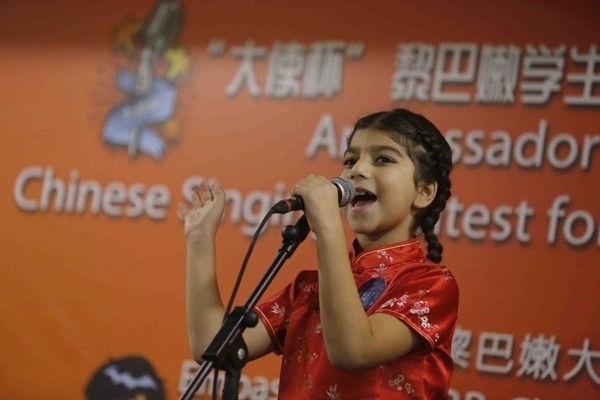Lebanese show off Chinese song skills
Xinhua | Updated: 2018-11-23 08:44

Lebanese students were excited to take part in the Ambassador's Cup on Sunday, a Chinese singing contest and show off their skills to the audience.
Around 40 students, aged from 6 to 25, participated in the contest, showing the growing interest of the Lebanese people in the Chinese language.
"I have always wanted to learn Chinese, which is a very important language," 18-year-old Martine Mardini says.
"I have always had a great interest in the Asian culture," she adds.
Mardini, who won the first place in the contest for students of her age, studies Chinese language at the Lebanese University.
The language is not easy, but with practice it becomes easier, she says, adding that she participated in the contest with encouragement from her teacher.
"It is a challenge I wanted to take. I worked a lot to memorize the song, but I am very happy about it," Mardini says.
Likewise, 25-year-old Elsa Maria Karam says she felt very excited about the singing contest.
"I participated to get to know other people interested in the Chinese culture," says Karam, who has been learning Chinese for four years.
"I am applying for jobs in different parts of China," she says, adding that she is interested in working in management consultancy in China.
Gina Dagher says she participated in the contest because she loves to "sing in Chinese and to see others singing as well".
Dagher, who started learning Chinese at a younger age, does not find the language as difficult as others.
"I find it very easy to learn Chinese. I am planning to continue learning this language," the 9-year-old says.
Eliana Ibrahim, managing director at the International Union of Chambers and Associations, highlights the fun and interest of the contest.
The contest allowed children and students to sing happily while practicing the Chinese language, she says, adding that such competitions are more valuable than insisting students continuously write essays.
Chinese Ambassador to Lebanon, Wang Kejian, agrees that such an event encourages Lebanese students to learn the Chinese language and increases their interest in the Chinese culture.
The Lebanese students, whether university, middle or primary school age, have shown great enthusiasm for learning Chinese in recent years, Wang says.
"We think this is a very good step to enhance cultural exchanges and to strengthen the friendship between our two countries," he notes.
In addition, businessmen in Lebanon are also showing interest in the Chinese language, according to Ibrahim.
She attributes Lebanese interest in the Chinese language to the increasing number of business events involving the two countries in the past few years.
"When you learn the Chinese language, you also learn the culture which helps you in better dealing with Chinese people on the business level," says Ibrahim.
























